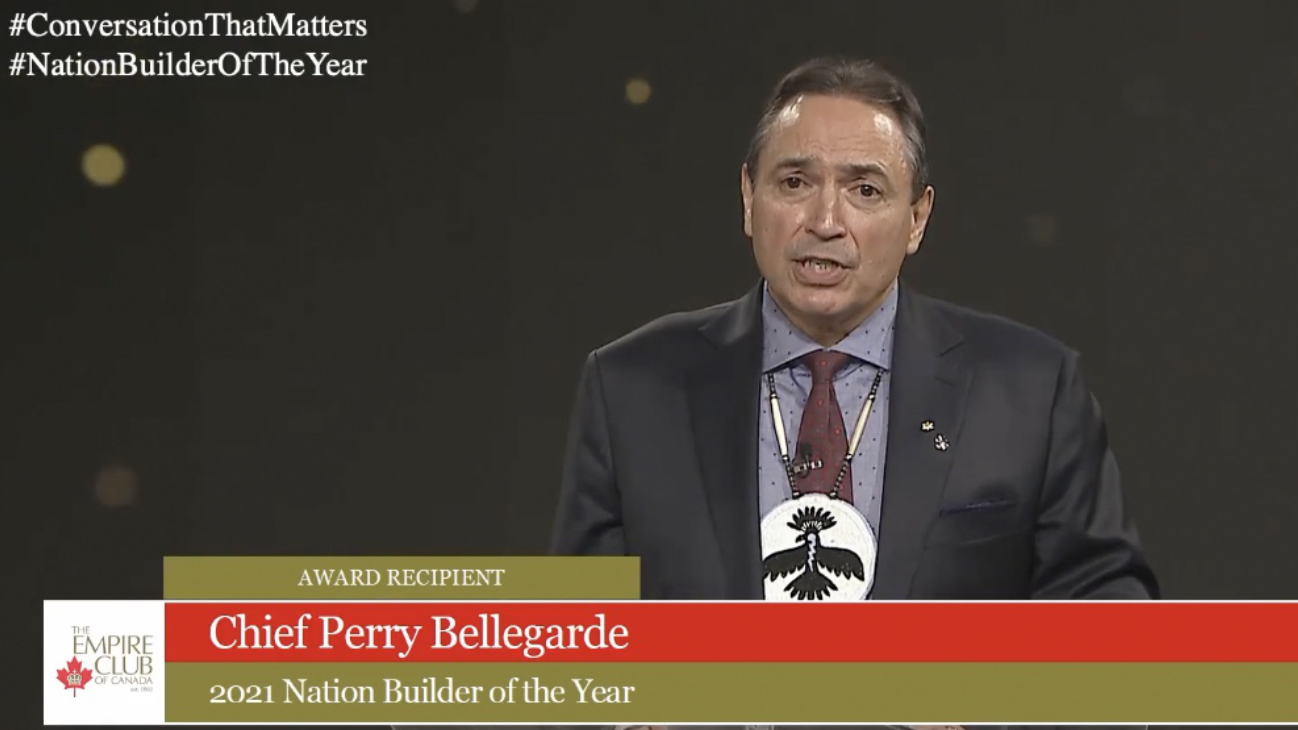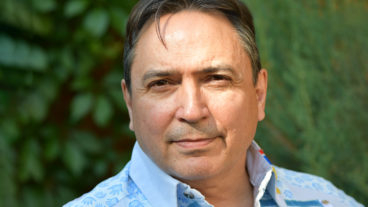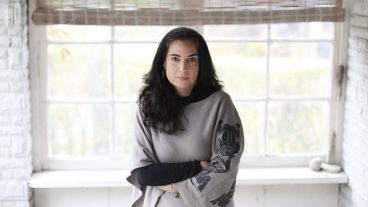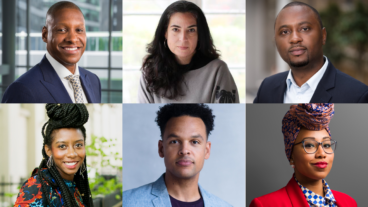Chief Perry Bellegarde shared his compelling vision for building an inclusive future for all Canadians when accepting the 2021 Nation Builder of the Year Award from the Empire Club of Canada.
An award that celebrates and provides a platform for people who are building our country, Perry is the 2021 recipient in recognition of him dedicating his life to championing the rights and well-being of First Nations. He served two terms as the National Chief of the Assembly of First Nations, where he campaigned tirelessly to close the gap in the quality of life between First Nations and other families in Canada.
Perry’s vision for Canada’s future is one that lives true to the heart of the original Treaty relationships — a vision of mutual respect, peace, and friendship that is the key to building a better and brighter future for all Canadians.
Watch his powerful speech in the video below or read the transcript included in this blog post.
To all my relatives and friends, I greet you all in a humble and respectful way. I am Cree from the Little Black Bear First Nation and like most of you, I’m also a Treaty person.
Little Black Bear entered into Treaty 4 with Queen Victoria in 1874 when Canada was still a very young nation. I was raised to understand that “Treaty” through a First Nations worldview is all about relationships. Right relationship among all people and right relationship between human beings, our two-legged tribe, and all of creation.
Treaty-making is a sacred act meant to build lasting bonds of mutual respect, peace, and friendship between First Nations and the newcomers to our lands and that’s why we still say we are all Treaty peoples. An expression that embraces all of our neighbours. And today, in a world that’s increasingly divided, in where we face such profound threats to our health and our survival, I believe that the pursuit of right relationship is more important than ever.
I’m honoured to be named Nation Builder of the Year by the Empire Club of Canada, and I’ll admit that the very name Empire Club gives me pause. However, as I told the organization, to be recognized as a “nation builder” is an honour that I’m very proud to embrace. Let me explain.
For me, nation building has two meanings that must go hand in hand. The first is the work of restoring First Nations as nations in the fullest sense of the word. To thrive in the 21st century, First Nations must have the freedom to make our own decisions according to our own values, and our traditions, our customs, and our laws. That is the essential foundation for ensuring future generations can thrive and prosper as First Nations, the way that our ancestors intended.
The second aspect of nation building is the still unfinished work of making Canada the just and fair country that it has always claimed to be. And this requires Canada to finally come to terms — to reconcile itself — to the reality of unsurrendered and undiminished Indigenous sovereignty.
It also requires restoring the balance between Canadian society and the natural world that sustains all of us. The Treaty relationship was intended to last as long as the sun shines, the rivers flow, and the grass grows. And today, we are living through a time of pandemic, economic crisis, and a growing threat of a global environmental catastrophe. It seems like every day we are given new reasons to fear for the world that our children and our grandchildren will inherit. As we are already seeing, our climate and the Earth itself, things that had seemed eternal to our ancestors, are now in peril.
Rebuilding from COVID and developing the resilience needed to face future pandemics and addressing the threat of climate change will all require profound change in society and the economy. Changes we cannot possibly achieve unless we can unite around common goals. Our future — all of our futures — will depend on our ability to break down the walls that divide us. We all need to learn with people who are different from us, with whom we disagree, even if the conversations are difficult, and I would say, especially if the conversations are difficult.
The original spirit and intent of the treaties is all about peaceful coexistence and mutual respect across the divisions of nation and culture. It really means learning to live and work together. True inclusivity includes not just greater opportunity for individual participation in the institutions and structures of Canada. But also inclusivity of worldviews, of knowledge systems, and laws so that those institutions and structures will change for the better.
It is my deep conviction that such inclusivity will ultimately benefit all Canadians. Put simply, First Nations have a lot to offer in making this country a better place for all of our children and grandchildren. I am planning to devote my life to building a better world by working with those who share my conviction. Together, we can ensure that future generations have the chance to grow up and thrive in a safe and healthy environment.
There’s still time to take meaningful action on climate change needed to make this future possible. And there is still time to care for our natural world. And we can all work hard to achieve racial justice. My model, as always, is the example of my ancestors who taught us that peace, friendship, and mutual respect are the foundations of nation building.
Now more than ever we need to be in right relation, with each other and the world around us.
Interested in learning more about Chief Perry Bellegarde and what he can bring to your next event as a keynote speaker? Email us at [email protected].




